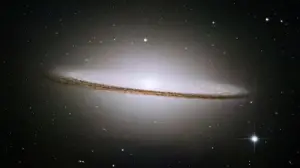
Astronomers have unveiled the discovery of the universe’s
largest “ghost galaxy,” known as Dragonfly44, an enigmatic entity that is 99.99 percent dark matter. This galaxy, labeled as the universe’s darkest, was initially spotted near Hawaii in 2014, but it’s only recently that studies have confirmed its enormity and explained its stable existence.
Intriguingly, Dragonfly44 is approximately the same size as
the Milky Way, yet it contains merely 1% of the number of stars. This anomaly led scientists to puzzle over its stability, as gravity alone would have disintegrated it. The key to this conundrum appears to be dark matter.
The ghost galaxy’s faintly lit nature explains why it
remained hidden for so long. Scientists now theorize that it’s largely made up of dark matter, accounting for its stability. Without the presence of this mysterious matter, the galaxy would have collapsed under the force of its own gravity.
Yale University astronomer Marla Geha opined, “If such
galaxies aren’t rare or only form in specific, dense regions like galaxy clusters, our understanding of galaxy formation might need revising.”
While dark matter is estimated to compose 27% of the visible
universe by NASA, its nature and workings remain a mystery. Its existence is inferred primarily from its impact on the universe’s expansion.
Lead researcher Pieter van Dokkum posits that these galaxies
exist in a turbulent, dense region of space teeming with dark matter and galaxies. He suggests that these galaxies might be cloaked in invisible dark matter “shields,” protecting them from the galactic onslaught.
This discovery not only underscores the vast, uncharted
territories of our universe but also challenges our current understanding of galaxy formation and dark matter. It calls for an in-depth examination and possibly a revision of the theories that we’ve held so far, propelling the scientific community into a new era of space exploration and understanding.
Reference

